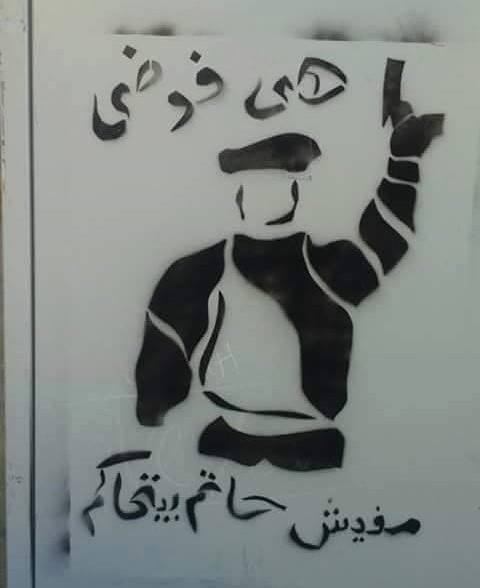Latest NEWS
- Aswat Masriya, the last word
- Roundup of Egypt's press headlines on March 15, 2017
- Roundup of Egypt's press headlines on March 14, 2017
- Former Egyptian President Hosni Mubarak to be released: lawyer
- Roundup of Egypt's press headlines on March 13, 2017
- Egypt's capital set to grow by half a million in 2017
- Egypt's wheat reserves to double with start of harvest -supply min
- Roundup of Egypt's press headlines on March 12, 2017
Allegations of police torture spark public outrage

Graffiti featuring a police officer carrying a gun taken from a popular Egyptian movie "Chaos".
CAIRO, Nov. 30 (Aswat Masriya) - Graffiti filled the walls of Luxor's streets in a public condemnation of the death last week of Talaat Shabib allegedly at the hands of police.
Referring to the obnoxious protagonist (a policeman) of "It is Chaos", a 2007 Youssef Chahine movie tackling police brutality and corruption in a premonition of the January 2011 uprising, the angry graffiti bemoaned the lack of accountability in case after case of police torture leading to death.
Shabib was arrested on suspicion of possessing Tramadol, a pain killer used ubiquitously as a recreational drug in Egypt, at a cafe at 11 pm in the district of al-Amawya last Tuesday. Just hours later, he died as he was being transferred to Luxor International Hospital.
Friends and relatives of Shabib launched a Facebook page "We are all Talaat Shabib", in a case reminiscent of Khalid Saeed's, the 28-year-old, who was tortured to death on June 6, 2010 at Seedi Gaber police station in Alexandria and who's badly disfigured picture leaked out of the morgue went viral on social media.
Days later, virtual activists started the "We Are All Khaled Saeed" page on Facebook to raise awareness about the case and highlight the extent of police misconduct and lack of transparency in the controversial investigation which concluded that the cause of death was suffocation caused by swallowing a hashish wrap.
The Saeed case was one of the triggers of the 2011 uprising, as the Facebook page's administrators called for the January 25 protests specifically on Police Day to draw attention to police torture.
Shabib's death let to protests by his relatives and acquaintances in front of the Luxor police station, where 24 people were arrested, but released the next day.
One of Shabib's relatives, Youssef al-Rashidy, told Aswat Masriya that he was bewildered that Shabib died just a few hours after his arrest.
Even though four policemen are being questioned in relation to the case, none of them has been officially charged with a crime.
Shabib's case is but one of a slew of cases of alleged police torture that have caught the public's attention recently.
Earlier in November, Amr Saeed Abu Shanab died in custody at Shebeen al Qanater police station in Qaluibya governorate north of Cairo. Abu Shanab is believed to have been arrested on theft charges.
On Saturday, Ismailia was home to the death of veternarian Afify Hassan Afify, who died while being interrogated by police. El-Nadeem Center for the Rehabilitation of Victims of Violence published a preliminary forensics report which revealed that Afify sustained injuries to the back of his neck and that the body is still being examined.
In a video that went viral on social media, Afify is seen in his wife's pharmacy when four men in plain clothes entered and took him away. There was no violence in the video.
The police officer accused in the case, Mohamed Ibrahim, has been detained for four day pending investigations, according to Al-Ahram news website.
In a statement published on Nov.27, the the Pharmacists Syndicate condemned the storming of the pharmacy without a warrant or an inspector.
Egypt's constitution prohibits torture in all its forms and considers it "a crime that is not subject to prescription", as per article 52.
Article 55 stipulates that "every person who is either arrested, detained, or his freedom is restricted shall be treated in a manner that maintains his dignity. He/she may not be tortured, intimidated, coerced, or physically or morally harmed; and may not be seized or detained except in places designated for that purpose, which shall be adequate on human and health levels."
The article continued that violating any of the mentioned terms "is a crime punishable by law".
In an official statement published yesterday, the interior ministry said that it will take "any individual cases of misconduct" very seriously and that such incidents "do not in any way reflect the nature of the national duty performed by the police force," promising "transparent" investigations into recent allegations.
Local and international human rights organizations have repeatedly condemned what they describe as the routine excercise of police torture both at police stations and in prisons.










